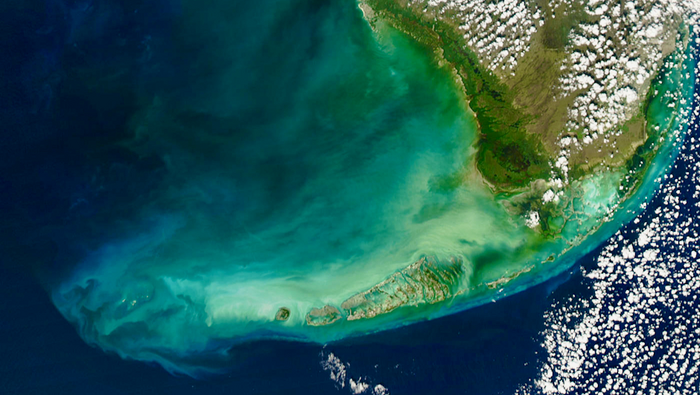MIAMI– A new study found that 70 percent of Florida’s reefs are eroding and experiencing net loss of reef habitat. The research, conducted by an interdisciplinary group of scientists through the NOAA Cooperative Institute for Marine and Atmospheric Studies at the University of Miami Rosenstiel School of Marine, Earth and Atmospheric Science, provides new information on the state of Florida’s world-famous coral reefs.

Credit: NASA
MIAMI– A new study found that 70 percent of Florida’s reefs are eroding and experiencing net loss of reef habitat. The research, conducted by an interdisciplinary group of scientists through the NOAA Cooperative Institute for Marine and Atmospheric Studies at the University of Miami Rosenstiel School of Marine, Earth and Atmospheric Science, provides new information on the state of Florida’s world-famous coral reefs.
“This research helps us to better understand which reefs along Florida’s reef tract are vulnerable to habitat loss and require management and restoration efforts to prevent further habitat loss,” said the study’s lead author John Morris, a researcher at NOAA’s Atlantic Oceanographic and Meteorological Laboratory. “On the contrary, we also identified reefs that may be potential hold-outs to reef development and are more likely to persist in the future.”
The researchers analyzed the benthic ecology, which is the assemblage of all living organisms inhabiting the sea floor, and parrotfish data from 723 reef sites in three biogeographic regions across the state’s reef tract to calculate each site’s carbonate budget. The reef tract extends 350 miles from the Dry Tortugas to the St. Lucie Inlet. A positive carbonate budget indicates a reef is growing over time, whereas a negative carbonate budget suggests the reef is losing structure.
The data, from NOAA’s National Coral Reef Monitoring Program and National Geodetic Surveys, was used to calculate carbonate production and carbonate erosion throughout South Florida. The primary drivers of carbonate budgets along the Florida reef tract are the amount of coral cover and parrotfish biomass. They found that 506 of the sites were losing reef habitat on an annual basis.
“These findings underscore the need for enhanced management strategies like outplanting corals to help restore coral structure that has been lost,” said study co-author Erica Towle, coordinator of NOAA’s National Coral Reef Monitoring Program and alumna of the UM Rosenstiel School. “Moving forward, we can use this as a baseline to implement and track the success of management strategies.”
The Florida Reef Tract is the only living coral barrier reef in the continental United States and the third largest coral barrier reef system in the world.
The largest drivers of coral loss in Florida over the last decade include bleaching events, ship groundings and disease, such as the stony coral tissue loss disease discovered in 2014 which continues to decimate Florida and Caribbean reefs.
According to NOAA, Florida’s coral reefs support 70,000 jobs and generate about $8.5 billion in sales and income annually. Healthy reefs also protect coastlines from flooding and storm surges.
“Unless management strategies are implemented, Florida’s eroding reefs will likely reduce the extent to which coral reefs can sustain these important economic and ecosystem services,” said Morris.
The study, titled “Low net carbonate accretion characterizes Florida’s coral reef,” was published Nov. 15 in the journal Scientific Reports. The study’s authors are: John T. Morris and Nicole Besemer of the University of Miami Rosenstiel School’s Cooperative Institute for Marine and Atmospheric Studies, Ian C. Enochs, NOAA Atlantic Oceanographic and Meteorological Laboratory, T. Shay Viehman, National Centers for Coastal Ocean Science, Sarah H. Groves and Cory Ames, CSS, Inc., Jeremiah Blondeau and Laura Jay W. Grove, NOAA Southeast Fisheries Science Center, Erica K. Towle, NOAA Coral Reef Conservation Program, and Derek P. Manzello, NOAA Coral Reef Watch.
The research was supported by the NOAA Coral Reef Conservation Program Project #743.
About the University of Miami
The University of Miami is a private research university and academic health system with a distinct geographic capacity to connect institutions, individuals, and ideas across the hemisphere and around the world. The University’s vibrant and diverse academic community comprises 12 schools and colleges serving more than 17,000 undergraduate and graduate students in more than 180 majors and programs. Located within one of the most dynamic and multicultural cities in the world, the University is building new bridges across geographic, cultural, and intellectual borders, bringing a passion for scholarly excellence, a spirit of innovation, a respect for including and elevating diverse voices, and a commitment to tackling the challenges facing our world. Founded in the 1940’s, the Rosenstiel School of Marine, Atmospheric, and Earth Science is one of the world’s premier marine and atmospheric research institutions. Offering dynamic interdisciplinary academics, the Rosenstiel School is dedicated to helping communities to better understand the planet, participating in the establishment of environmental policies, and aiding in the improvement of society and quality of life. www.earth.miami.edu.
Journal
Scientific Reports
DOI
10.1038/s41598-022-23394-4
Subject of Research
Animals
Article Title
Low net carbonate accretion characterizes Florida’s coral reef
Article Publication Date
15-Nov-2022
COI Statement
none




